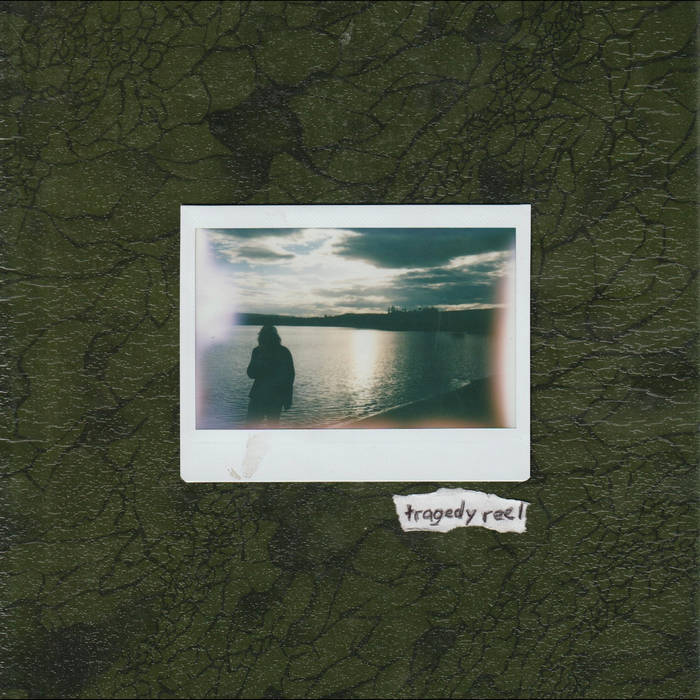Fog Lake’s ‘Tragedy Reel’ is a poetic expression of nostalgia

Fog Lake
Tragedy Reel
Orchid Tapes · April 23, 2021
Under the name Fog Lake, Aaron Powell has released a vast discography of nostalgic and sorrowful lo-fi music. With the latest Fog Lake release, Tragedy Reel, Powell continues to deliver songs that are distinctly melancholy and poetic. Although he sticks to his signature sound, he also uses Tragedy Reel to venture into a more personal realm than those he has explored previously. The album features more specific and personal lyrics, while maintaining Fog Lake’s poetic style of writing. Tragedy Reel ultimately offers up exactly what avid Fog Lake listeners would hope for and even cuts a bit closer to the heart than usual, in part due to a gentler approach. The album takes on a tone that is wistful and, for the most part, acts as a soft-spoken but powerful reminder of the past. Taking full advantage of the lo-fi genre, Fog Lake’s Tragedy Reel is poignant and intimate.
The album is decidedly sad, as would be expected from Powell. In fact, some of the songs sound almost foreboding. “Sullivan” utilizes minimal instrumentation and lyrics like, “The bodies you invade all outlined on pavement now,” to establish this haunting sound. Similarly, “Crystalline” has an eerie feel that is brought about by the vocals being nearly drowned out by somewhat dissonant instrumentation. Even at the end of this song, as the dissonance fades, murky synth pads fill the space between more deliberate piano chords and guitar strums that are slow enough to allow each string to be heard individually.
However, many of the other songs on the album are comparatively less eerie and more wistful. As tends to happen when a song is named after a specific place or a specific person, “Dakota” is one of the more intimate-feeling songs on the album. With the entrance of sweet-sounding strings and the addition of vocal layers, the song sounds as if Powell is revisiting a memory and then floating back out of it. Still, the peak of nostalgia in Tragedy Reel is unequivocally “Crocodile.” Powell uses a gentle guitar part that lends the song an uncharacteristically peaceful and pleasant mood, but there is also a bittersweet edge in the piano part and the nearly-whispered vocals. The most surprising and perhaps most successful aspect of “Crocodile” are the “Oh’s” in the background that sound as if they have been put through a vocoder. Powell’s whispery vocals even sing along with these “Oh’s,” which comes as something of a surprise. This is a format of vocals that one might expect to hear from an artist with a happier discography, yet Powell claims the syrupy style as his own and successfully conveys the bittersweet feeling associated with so many memories. Finally, the use of strings amps up in “Pity Party” and “June” to conclude the album with a sweetly tragic tone that is fitting to its sorrowful themes. More so than previous Fog Lake projects, Tragedy Reel hones in on a deep-seated feeling of nostalgia.
Within this nostalgic album are more specific ideas of confusion, futility, and reflection that are carried through the lyrics. In “Dakota,” Powell seems to grapple with the thought of letting go of what he once had with someone. His internal conflict is on full display in lyrics such as, “cause I wouldn’t wanna stay here with you / but I don’t wanna leave here without you.” Powell draws another comparison when he sings, “I put the past away / at least till it came back again.” These lyrics use juxtaposition to convey the feeling of being torn as things change with time. In the same vein, some of the lyrics in Tragedy Reel place an emphasis on the fact that all things come to an end, and the end is not always pleasant. “Crocodile” sees Powell describing “the last of our teenage days.” He recalls, “You cried all the time / Until your heart finally went cold / Faded red to blue / Condensed the summer into poems.” Both the lyrics and the instrumentation suggest that these teenage days are missed, and yet Powell makes it clear that these days now exist only in memory and perhaps in the poetic lyrics of songs like this one. Finally, both “Catacombs” and “June” offer a cynical reflection on where Powell and the people he knows are now. “Catacombs” beautifully describes a certain hollow feeling with “You see it too / All the catacombs running through you.” This same truth, the emptiness lying at the center of things, is described in “June” as Powell seems to form an analogy between flings of empty love and drug use. He offers a warning to the person who is the subject of the song, saying, “but I’d be careful what / You’re doing out there baby / cause it’s always over by June.” The lyrics in Tragedy Reel reflect on intimacy and change in a multifaceted manner.
In general, Tragedy Reel is anchored in Fog Lake’s signature sound, but explores softer regions of sadness and takes listeners on a more personal journey. Powell does all this while meeting the high lyrical standards set by his previous releases. Tragedy Reel is well balanced in its wistful descriptions of the past, dejected observations of the present, and angst-ridden contemplations of change.